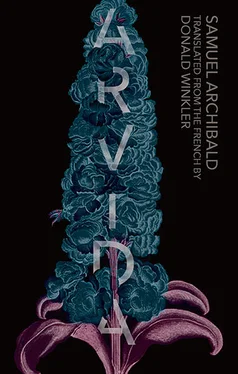The Montagnais who cut wood with the rest of us in the camp, I always asked him to tell me what the Indians called the places we went. One day when we were really far north, I asked him the name of the lake where we’d stopped for lunch. He shrugged his shoulders.
“You don’t know?”
“It’s not that. Your lake has no name.”
“What do you mean, no name?”
“No one ever comes here.”
Unless they had a good reason, the Indians never strayed from their traditional portages and their navigable waterways, and they felt no need to give names to places they never visited. It was a European obsession to go everywhere and it became an American obsession to build roads that led nowhere. Those roads, Menaud and I, we’d done at least half of them. We couldn’t count them in those days, we couldn’t know where they would lead. America was a kind of big asphalt map traced right onto the land, a continent to rediscover. I’m sure they’re all labelled now, those roads, mapped so you can follow them with a finger on your GPS. My son-in-law has even bought a car that talks. It’s always telling him he’s taken the wrong road, and I’ll be damned if I’ll ever let a machine speak to me like that.
After 1971 I never heard from Menaud, I didn’t know if he was alive or dead, and I decided that one morning he must have gone back to the mud at the fort of Louisbourg, or where he came from. We’d travelled together for a long time, he and I, and we’d probably still be travelling together if I hadn’t met Louise during my last year at university. We’d never much called each other my beauty or my love, nor later my wife or my husband, but one day she said to me, “If you like, we could get married.” It’s not a great love story, certainly, but it’s ours. I’d never thought about marriage before, but I said yes right away, and later I realized that was exactly what I wanted. We had four daughters more beautiful than their mother and more intelligent than me. They’re big now, but they can’t leave hold of their mother, whom they telephone three times a day. They have the whole world at their feet, and you’d think they were afraid of everything. It’s something I can’t understand.
Louise is a doctor, and I was a forestry engineer. She’s spent her life taking care of people, and I’ve spent mine taking down trees. That’s the way it is. In a few months, she’ll be retiring too. And we’ll travel. We’ve travelled already, but not much in recent years. Louise likes it a lot, but not me. They always hold us by the hand on those tours, and it seems to me that you can’t really travel bundled up with other little oldsters in a bus, with guides who explain everything you see through the window like you’re all six-year-old children. I’d like to show her the ground we covered, Menaud and I, back then.
Meanwhile I garden, I read, and I do errands. About four o’clock I go out to buy what we need for the night’s meal and the next day’s lunch. They’ve built a big supermarket right next to Canadian Tire, on the other side of the overpass. You have to turn right for the groceries and left for the highway. I often turn left. Louise knows it, just as she knows that I always come back in the evening with the supper.
Late June.
Half asleep, Jim hears the rain falling non-stop onto the truck, the two woodsheds, and the piles of wood waiting to be dried, cut, split. He imagines the rivulets streaming down the little dirt path winding its way to the road for kilometres through angiosperms and gymnosperms, the great cavalcade of all the species present at that latitude, spared by the forestry company because it wasn’t worth their time to clear the concave tongue of land stretching from their camp to the road between two mountains. Half asleep, Jim knows his land and knows that the rain is irrigating the sugar maples, the cherry trees, the paper birch, the black ash, the trembling aspen, the red oak, the linden trees, two white pines as tall as the CN Tower, the rotten trunk of an American elm, centenarian three times over, that had to be cut down because it was sick with bark beetles, the balsam fir, the white spruce and black spruce, the Canadian thuja, the red-fruited sumac from which Doris, in the summer, makes a kind of acid lemonade, and the mountain ash with their big orange fruits that drive the birds crazy. Jim hears a great mad wind that’s blowing through the trees and whistling between the walls and under the outhouse roof.
Half asleep, he’s on the same plane as the other forest creatures, waiting for the storm to calm where they lie on their beds of branches, leaves, and moss, less comfortable than his own. Though he’s seen the bad weather heal itself a thousand times, part of him thinks the squall will last forever.
Half asleep, Jim tells himself that the rain will stop and that, as always after a storm, the animals will come out of their shelters in search of sun. As the first light shines through, the partridges let their chicks frolic out in the open on the gravel paths, and the rabbits swarm like insects along the roads, veering off very late, sometimes too late, when they hear tires crunching on the gravel. It’s during this brightening that he’s seen the rarest animals. The black bear on the woodcutters’ camp road. The moose that crossed the Joe Roth River while he was teasing trout massed in a shadowed bowl, with great arcing casts. The lynx by the lake, crouched in grasses, under branches. Half asleep, Jim can tell by the weight and smell of the air that the rain won’t be stopping for a while and that he must summon the patience of the other animals, those that hunt, those that answer to the periods of the moon and only come out at night.
He gets up and puts water on the stove to heat in an old iron kettle, and goes out on the porch to gather logs and birch bark from the wood box. The air is cool, humid inside and out, and the cabin floor is as cold as a steel spoon before you dip it into the soup. His father stirs in his bed and opens his eyes. The water begins to rumble in the kettle. His father emits a sigh that becomes a rattle, then a coughing fit, and asks:
“What’s new?”
“Not much, pa. You?”
His father sits up in bed.
“We wanted to go fishing with Luce. We took the rods and the tackle, then Luce waited in the boat while we loaded the cooler on, then the worms. She was wearing your mother’s hat, with a really nice army jacket.”
Jim lights the balled up newspaper he’d thrust into the stove under the crossed logs.
“Did you catch anything good?”
“No. At the last minute Réjean arrived and said he didn’t want her to go with us. So we never went.”
“And then?”
“Then nothing. I was in the dark. There was lightning and thunder and it was raining just like now. Maybe I wasn’t asleep any more, just turning over and over in bed.”
He clears his throat.
“Did you see your animal again?”
The day before, they’d gone to Armand Guay’s at Lac de la Belette. They’d brought him beer from down below. When they arrived, Armand handed a bottle to his father, and asked Jimmy if he wanted to go fishing. Jimmy knew it was a way of getting him out of the way so as to get drunk with his father in peace, but they’d been in town for a week and Jim was dying to put his line in the water. He said yes, and Armand’s dog followed him to the dock and jumped in the boat without his having to say a word. He started the motor with three good pulls on the cord, and headed north towards the islands that block access to the bay. Lac de la Belette is full of pools and tributaries, and he fished for a long time with Sunny seated in the stern. Jim got a bit scared when it became dark, but right then there was an electric sizzle in the air. Armand had started the generator, and the lights over the boathouse burned bright like a beacon set into the mountain.
Читать дальше












